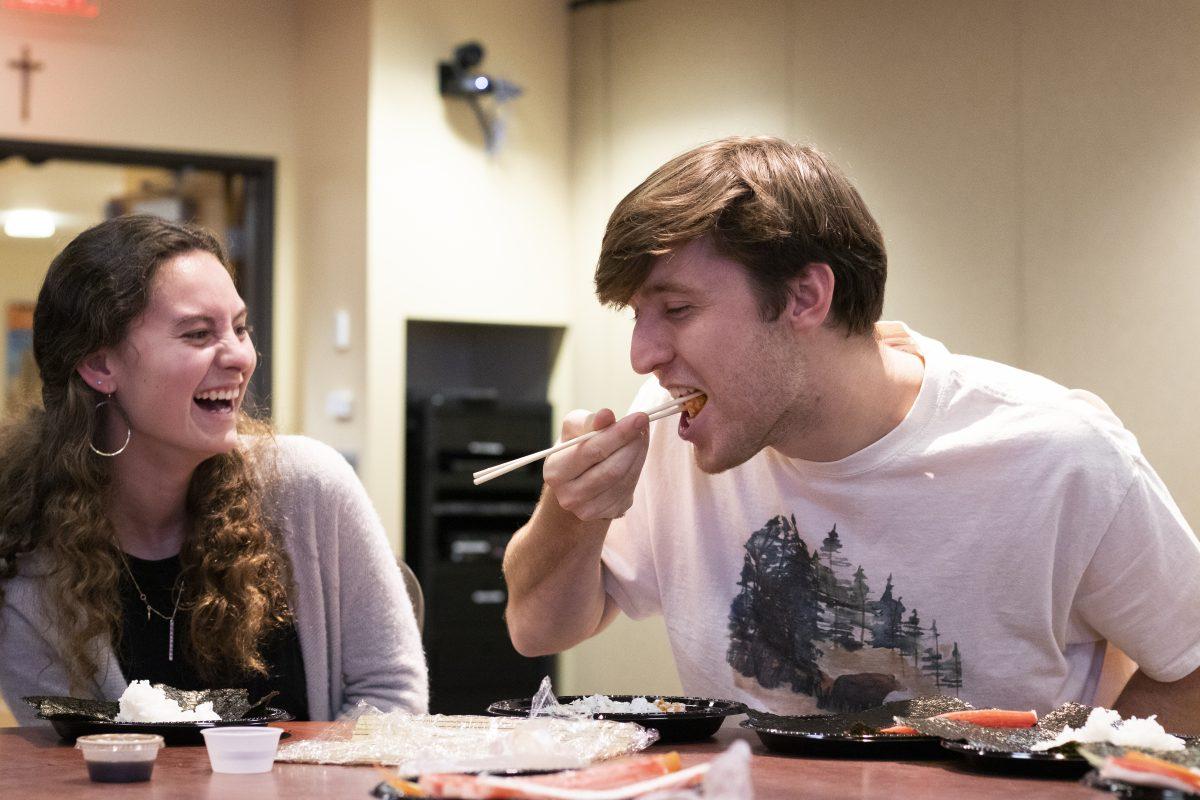The Asian Student Association (ASA) and the Japanese Culture Club held their annual Sushi Night on Oct. 28 in Doyle Banquet Hall South. The event consisted of students not only making and eating sushi, but learning about the history behind this Japanese dish.
The executive board members of ASA had positive feedback about the event. Miguel Lopez ’20, treasurer of ASA, said he was shocked with the turnout of students.
“I wasn’t expecting this big of a turnout,” Lopez said. “I am pleasantly surprised that we got this many people. And I guess the fact that we ran out of sushi is a good problem to have.”
Many participants attended the event, filling the venue completely. Teddy Bacon ’23 shared positive feedback on the event after creating his own sushi roll for the first time.
“I thought it was a lot of fun,” Bacon said. “The sushi was really good. It was fun to learn something new.”
Anna-Maria Berezovski ’21, president of the Japanese Culture Club, shared her positive thoughts on the events as well.
“We had a bigger turnout than last year, and last year we had a big turnout.” Berezovski said, “So, I think every year it’s going to get more and more popular and I think that’s awesome.”
Sushi Night has been a popular event on St. Joe’s campus in past years. Ting Brown ’20, vice president of ASA, said she appreciated the students who come to this event.
“It’s really nice to be heard because not a lot of minority voices are heard on campus,” Brown said. “The fact that a lot of people are willing to come and experience this culture is really uplifting.”
However, there is one wish that members, like Lopez, have emphasized.
“Based on the last few years, the events that have the free food are the ones that usually have a crowd,” Lopez said. “I kind of wish they would come even without the free food.”
Members of ASA and the Japanese Culture Club said they hope to express the importance of spreading their club’s culture more.
“There’s benefits of sharing every culture,” Berezovski said. “It’s just good to get to know what’s out there, what’s diverse, and be able to see the world in a different perspective. And I think that this allows that.”
Lopez said all cultures are important to acknowledge, especially considering the recent racial bias incident on campus.
“With everything going on [with the recent racial bias incident], it’s good that we are contributing to the diversity improvements we’ve been trying to do,” Lopez said. “We also have 15 international students from Japan here, so it’s a good thing we have them here.”
Contrary to popular belief, ASA and Japanese Culture Club are not exclusive to Asian students. Tim Hardy ’20, publicist of ASA, said he was not sure at first if he could join.
“To be honest, I didn’t think I was allowed to join the ASA,” Hardy said, “Our president, Mike Park, and our treasurer, Miguel Lopez, and even Ting [Brown], were like, ‘oh you should come. It doesn’t matter if you’re not Asian. We are just celebrating Asian culture. You don’t have to be Asian’. So then I went to an event and I just fell in love with the club.”
Not only do the members have a passion for the club, but they carry that passion to make the club more widely known on campus. Secretary Leslie Quan ’22 said she holds a specific goal for the future of ASA.
“I know we just had new international students from Japan come,” Quan said, “I want to make them feel more welcomed here, and that there’s people to back them up and support them, but I feel like now we haven’t really done anything with the international students, so that would be a big goal of mine.”
ASA and Japanese Culture Club emphasize the importance of community and creating a bond between all students. Specifically, ASA creates a community of not only students at St. Joe’s, but with other universities in the area who have similar organizations, such as Temple University, Drexel University and La Salle University. Hardy said having this community is motivation to members like him.
“The people I met, including people on this eBoard, are my best friends at this school,” Hardy said. “It’s not just the stuff we do, it’s the friends we make.”
ASA and Japanese Culture Club said they are happy to not only bring more attention to their clubs, but to the importance of spreading other cultures as a whole.
“This was a good way to spread some awareness and bring to attention that we exist,” Lopez said. “The people are more than welcome to stop by at our events.”














































